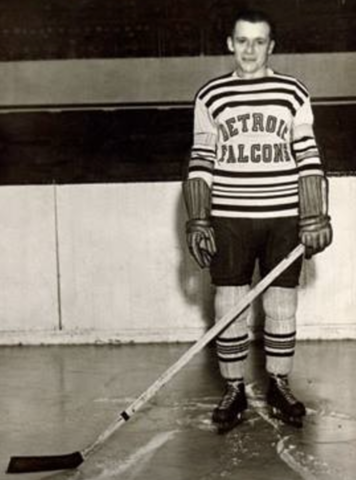IMAGE INFORMATION
EditCarson Eric "Shovel Shot" Cooper - Born July 17, 1897 in Cornwall, Ontario – Died July 4, 1955 in Hamilton, Ontario was a Canadian ice Hockey right winger, coach and scout.
- Stanley Cup Champion 1950, 1952 with Detroit Red Wings (scout).
- Prince of Wales Trophy Champion 1943, 1949, 1950, 1951, 1952 with Detroit Red Wings (scout).
- O'Brien Trophy Champion 1941, 1942, 1945, 1948, 1949 with Detroit Red Wings (scout).
Cooper played for the OHA Senior league's Hamilton Tigers from 1917 to 1924, scoring 116 goals over 6 seasons. Cooper was resistant to turning pro, mainly because he was being paid so handsomely under the table to remain an amateur. In 1924-25, the Boston Bruins, struggling desperately to assemble a team prior to their first NHL season, used blackmail to get Cooper’s name on a contract, gathering evidence of these illegal payments and threatening to take it to amateur Hockey officials if he didn’t turn pro with them.
Cooper played his first professional Hockey league game as a member of the Bruins on December 1, 1924 vs Montreal Maroons, also scoring his 1st NHL goal vs Clint Benedict at 9:50 of 3rd period at Boston Arena in a 2-1 Bruins win. His goal was the game winner.
Copper played in only 12 games that year because of a knee injury, scoring 5 goals, 3 assists.
In the 1925-26 NHL season, Cooper played in 36 games and was an offensive powerhouse, scoring 28 times, and the credit for Cooper’s touch around the net was given to his deadly accurate flip shot, a move which earned him the handle "Shovel Shot." The following year, Cooper got off to a slow start with 4 goals in 10 games was traded to the Montreal Canadiens in exchange for Billy Boucher in January, 1927. In 14 games with the Canadiens, he scored 9 goals and 3 assists.
The Bruins reacquired the rights to Cooper in May, 1927, but sold him right away to the Detroit Cougars for cash, where he did not miss a single game for the next 5 seasons. In 1929-30, Cooper had his highest point total in his NHL career with 36 points (18 goals). In 1931-32, the team became the Detroit Falcons, and Cooper dressed for all 48 games. Cooper led the Cougars in goals in each of his first three seasons with the team. He was Detroit’s leading scorer with 18 goals and 27 points in 1928-29.
After a year out of professional Hockey, Cooper joined the IHL's Detroit Olympics where he served a dual role of player and assistant coach, contributing 17 points.
Cooper played one more year with the Olympics and the Windsor Bulldogs before retiring after the 1934-35 season.
Cooper later returned to the Detroit Red Wings, and was a long time scout. Among Cooper’s finds were Hall of Famers Ted Lindsay, Red Kelly and Harry Lumley. Cooper's name was engraved on the Stanley Cup in 1950, 1952 with Detroit as a scout.





































